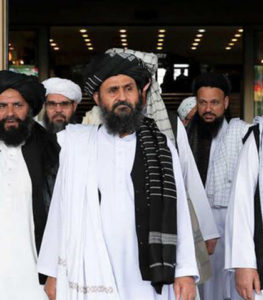Afghan peace talks breakthrough
Afghan government and the Taliban say they have made a breakthrough in peace talks that have seen a preliminary deal reached with the first written agreement after 19 years of war.
The agreement on sets out a pathway to further discussion but is considered a breakthrough because it will allow negotiators to move on to more substantive issues, including talks on a ceasefire.
 “The procedure including its preamble of the negotiation has been finalised and from now on, the negotiation will begin on the agenda,” a member of the Afghan government’s negotiating team told news media.
“The procedure including its preamble of the negotiation has been finalised and from now on, the negotiation will begin on the agenda,” a member of the Afghan government’s negotiating team told news media.
The Taliban confirmed a similar position on Twitter.
“A joint working committee was tasked to prepare the draft topics for the agenda of peace talks,” a joint statement from both sides said.
Afghan President Ashraf Ghani’s said through a statement that the agreement was “a step forward towards beginning the negotiations on the main issues, including a comprehensive ceasefire as the key demand of the Afghan people”.
US Secretary of State Mike Pompeo congratulated the two sides on “perseverance and willingness to find common ground”.
He said the United States would “work hard with all sides in pursuit of a serious reduction of violence and ceasefire”.
Reports from Kabul said that the two sides had agreed on a “three-page agreement codifying rules and procedures for their negotiations on a political road map and a comprehensive ceasefire”.
It comes after months of discussions in Doha, Qatar, but in Afghanistan, the two sides are still at war, with Taliban attacks on government forces continuing.
The Taliban has refused to agree to a ceasefire during the preliminary stages of talks, despite calls to do so from Western governments and the United Nations.
The Taliban has said it would only agree to a ceasefire only when the way forward for talks was agreed upon.
The United Nations has described the move as a “positive development”, tweeting that “this breakthrough should be a springboard to reach the peace wanted by all Afghans”.
One sticking point in recent negotiations has been the Taliban’s refusal to acknowledge the legitimacy of the Afghan government led by President Ashraf Ghani.
Observers say that both sides also know that Western powers are losing patience and aid has been conditional. They say both sides know they have to move forward to show some progress.
In a statement on Wednesday, Pakistan’s foreign ministry welcomed the agreement and said it was “another significant step forward”.
“The agreement reflects a common resolve of the parties to secure a negotiated settlement. It is an important development contributing towards a successful outcome of intra-Afghan negotiations, which we all hope for,” it said.
The Taliban was removed from power in 2001 by US-led forces. A US-backed government has held power in Afghanistan since then, although the Taliban have control over wide areas of the country.
Under deal agreed to in February, foreign forces are due to leave Afghanistan by May 2021 in exchange for security guarantees from the Taliban.
US President Donald Trump announced a speeding up of the withdrawal, despite criticism. The administration has since announced that there would be an increased withdrawal by January, but at least 2,500 troops would remain beyond then.
The German Foreign Ministry has warned NATO against withdrawing troops prematurely saying it should ensure that further troop reductions in Afghanistan are tied to clear conditions.












